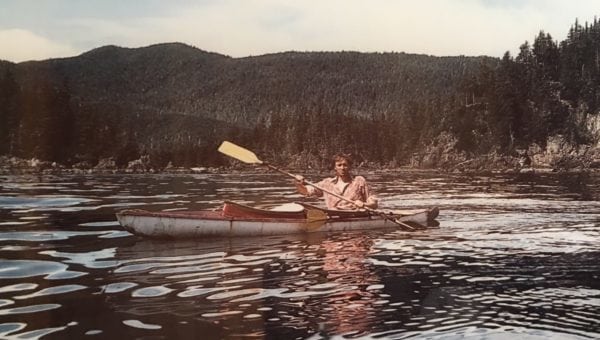 Forty years ago, in 1978, my wife and I agreed to cap our first year of marriage with an adventure. We decided to follow in the paddle-strokes of good friends who had just kayaked to what was then called the South Moresby archipelago of the Queen Charlotte Islands.
Forty years ago, in 1978, my wife and I agreed to cap our first year of marriage with an adventure. We decided to follow in the paddle-strokes of good friends who had just kayaked to what was then called the South Moresby archipelago of the Queen Charlotte Islands.
We chose the first two weeks of August and decided to travel alone as a couple.
Our pals had marked charts for us to follow, and we assembled a skookum set of rain gear, woollen pants, sweaters and a canvas tent from the just-opened Mountain Equipment Co-op. We flew to the Charlottes with a bunch of hungover loggers who were heading back to MacMillan Bloedel’s Juskatla camp.
I remember sitting next to a returning Canadian Coast Guard crew member who told me to, “Watch out for great whites in Selwyn Inlet,” when I told him our intended route. We had all seen the movie Jaws.
Over the following two weeks, we kayaked 15 km a day, braved southeasters, bucketing rain, black bear evening tent visits and a few days of blinding sun. We hooked and landed cohoes on hand lines, chased Norwegian rats out of food bags and never saw a great white. Orcas played off our beach camps and humpbacks passed us in the inlets.
Most importantly, we saw the Haida towns of Cumshewa, Cunhelas, Koona, Tanu and Hl’kia in all their abandoned splendour. We marvelled at enormous excavated house pits, photographed mortuary poles, and even had dreams of many people walking and talking by our tent in a language unknown to us.
We never saw another boat or person the entire trip. It was an adventure that benchmarked our start in married life that we still talk fondly of today.
Last week, I returned from a week in Haida Gwaii at a Canadian Parks and Wilderness Society (CPAWS) national board meeting. While I’ve had many return visits as a consultant, this was the best opportunity to savour just how much has changed over four decades. I got to travel down to Hl’kia and Koona on a one-day boat excursion, visit many old friends and hike the trails in Naikoon Park.
The whole time, I found myself emotionally alive to the great pace of change, on so many levels, since we launched our kayaks that summer of 1978.
While Haida Gwaii’s beauty still abounds, that’s more than I can say for Juskatla camp, and the once mighty MacMillan Bloedel logging company. Juskatla has been bulldozed to oblivion and MacBlo are no longer a part of B.C. corporate culture. You really date yourself by referring to them in conversation. But I can’t forget the old-growth forest they razored off the hillsides.
Meanwhile, the old hippy-run Mountain Equipment Co-op has conversely become a Canadian megastore chain. It carries all the latest high-tech expedition gear and specializes in dressing millennials for urban biking excursions. Our old MEC wool outfits are now so yesterday that they’re theatrically funny. But they still work. I wore mine again last week. At least wool is a constant.
The most powerful local change since 1978 is the strong Haida assertion of sovereignty in Haida Gwaii, and particularly their co-management with Parks Canada of Gwaii Haanas. Haida language place names abound, and no one uses the Queen Charlotte Islands or South Moresby in speech or print.
The ecotourism businesses run by the Haida (we stayed at Haida House at Tllaal and took Haida Style Expeditions boats and their wonderful guides down to Hl’kia and Koona) are simply world class. Check out their TripAdvisor ratings.
The total atmosphere of Haida cultural tourism is welcoming, attentive to detail (especially safety details on the water), outstanding in terms of interpretation (especially at the Haida villages in Gwaii Haanas and the Haida Heritage Centre at Kay Llnagaay), and engaging at a human level with humour and rigour at play simultaneously.
The presence of Haida Gwaii Watchmen (and women) at both Hl’kia and Koona was both welcoming and reinvigorating.
My memories of visiting those villages 40 years ago were tinged with sadness. Today’s new memories are enriched by the power of the Haida spirit, so obvious in the Watchmen who spoke to us about their responsibilities and guardian roles.
Gwaii Haanas is reborn.
Troy Media columnist Mike Robinson has been CEO of three Canadian NGOs: the Arctic Institute of North America, the Glenbow Museum and the Bill Reid Gallery.
The views, opinions and positions expressed by columnists and contributors are the author’s alone. They do not inherently or expressly reflect the views, opinions and/or positions of our publication.






